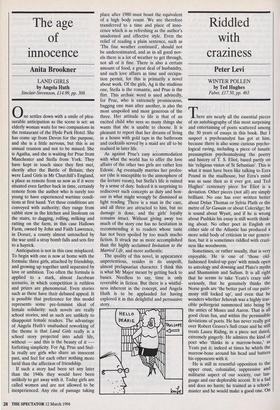The age of innocence
Anita Brookner
LAND GIRLS by Angela Huth Sinclair-Stevenson, f14.99, pp. 308 One settles down with a smile of plea- surable anticipation as the scene is set: an elderly woman waits for two companions in the restaurant of the Hyde Park Hotel. She has come up from Devon for the purpose, and she is a little nervous, but this is an annual reunion and not to be missed. She is Agatha, and she is waiting for Prue from Manchester and Stella from York. They have kept in touch since they first met, shortly after the Battle of Britain; they were Land Girls in Mr Churchill's England, a place as remote from us now as if it were situated even farther back in time, certainly remote from the author who is surely too young to have experienced wartime condi- tions at first hand. Yet these conditions are conveyed with authority; they range from rabbit stew in the kitchen and linoleum on the stairs, to dagging, rolling, milking and ratting on the farm, in this case Hallows Farm, owned by John and Faith Lawrence, in Dorset, a county almost untouched by the war until a stray bomb falls and sets fire to a hayrick.
Anticipation is not in this case misplaced. To begin with one is now at home with the formula: three girls, attached by friendship, and growing up together until separated by love or ambition. Too often the formula is applied to a stark, almost Jacobean scenario, in which competition is ruthless and prizes are phenomenal. Even stories such as these have their debased appeal. It is possible that preference for this model represents some pre-feminist ideal of female solidarity: such novels are really school stories, and as such are unlikely to disappoint female readers. The advantage of Angela Huth's unabashed reworking of the theme is that Land Girls really is a school story projected into adult life, without — and this is the beauty of it forfeiting simplicity. For Ag, Prue and Stel- la really are girls who share an innocent past, and feel for each other nothing more lurid than the affection of friendship.
If such a story had been set any later than the 1940s they would have been unlikely to get away with it. Today girls are called women and are not allowed to be inexperienced. Any rite of passage taking place after 1980 must boast the equivalent of a high body count. We are therefore transferred to a time and place of inno- cence which is as refreshing as the author's unadorned and effective style. Even the relief of reading a plain sentence, such as `The fine weather continued', should not be underestimated, and as in all good nov- els there is a lot of weather to get through, not all of it fine. There is also a certain amount of food, a great deal of husbandry, and such love affairs as time and occupa- tion permit, for this is primarily a novel about work. Of the girls, Ag is the studious one, Stella is the romantic, and Prue is the flirt. This archaic word is used advisedly, for Prue, who is extremely promiscuous, bagging one man after another, is also the most unspoiled and most generous of the three. Her attitude to life is that of an excited child who sees so many things she wants that she is unable to choose. It is pleasant to report that her dreams of living in a house with gold taps in the bathroom and cocktails served by a maid are all to be realised in later life.
As against Prue's easy accommodation with what the world has to offer the love affairs of the other two girls are rather less Edenic. Ag eventually marries her profes- sor (she is susceptible to the atmosphere of the lecture room), but Stella's life is ruined by a sense of duty. Indeed it is surprising to rediscover such concepts as duty and hon- our in what might wrongly be dismissed as light reading. There is a man in the case, and all three are attracted to him, but no damage is done, and the girls' loyalty remains intact. Without giving away too much of the story one has no hesitation in recommending it to readers whose taste has not been spoiled by too much macho fiction. It struck me as more accomplished than the highly acclaimed Invitation to the Married Life, and more authentic.
The quality of this novel, in appearance unpretentious, resides in its unspoilt, almost prelapsarian character. I think this is what Mr Major meant by getting back to basics. Needless to say, time is only reversible in fiction. But there is a wistful- ness inherent in the concept, and Angela Huth is to be applauded for having explored it in this delightful and persuasive story.


















































 Previous page
Previous page